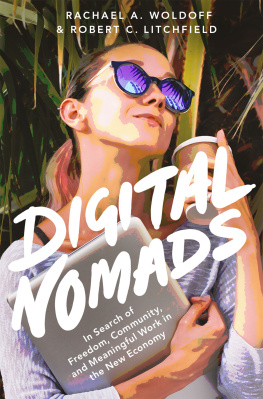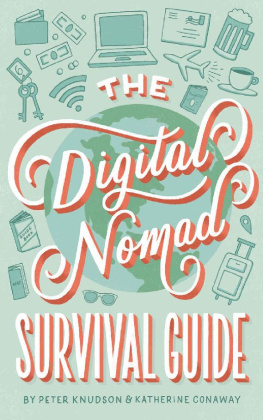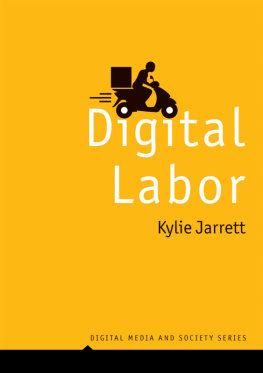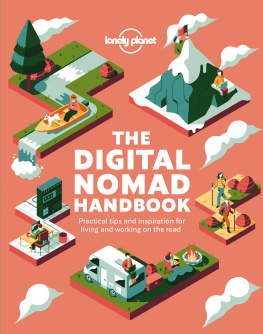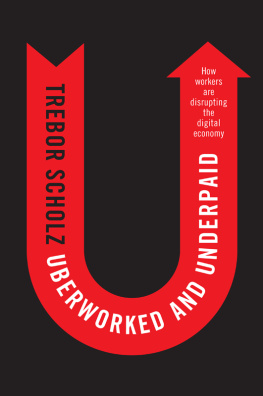Digital Nomads

Oxford University Press is a department of the University of Oxford. It furthers the Universitys objective of excellence in research, scholarship, and education by publishing worldwide. Oxford is a registered trade mark of Oxford University Press in the UK and certain other countries.
Published in the United States of America by Oxford University Press
198 Madison Avenue, New York, NY 10016, United States of America.
Oxford University Press 2021
All rights reserved. No part of this publication may be reproduced, stored in a retrieval system, or transmitted, in any form or by any means, without the prior permission in writing of Oxford University Press, or as expressly permitted by law, by license, or under terms agreed with the appropriate reproduction rights organization. Inquiries concerning reproduction outside the scope of the above should be sent to the Rights Department, Oxford University Press, at the address above.
You must not circulate this work in any other form and you must impose this same condition on any acquirer.
Library of Congress Cataloging-in-Publication Data
Names: Woldoff, Rachael A., author. | Litchfield, Robert C., author.
Title: Digital nomads : in search of freedom, community, and meaningful work in
the new economy / Rachael A. Woldoff and Robert C. Litchfield.
Description: New York, NY : Oxford University Press, [2021] |
Includes bibliographical references and index.
Identifiers: LCCN 2020022225 (print) | LCCN 2020022226 (ebook) |
ISBN 9780190931780 (hardback) | ISBN 9780190931803 (epub) | ISBN 9780190931810
Subjects: LCSH: Knowledge workers. | Flexible work arrangements. |
Telecommuting. | Self-employed. | Alternative lifestyles.
Classification: LCC HD8039. K59 W65 2021 (print) |
LCC HD8039. K59 (ebook) | DDC 331.7dc23
LC record available at https://lccn.loc.gov/2020022225
LC ebook record available at https://lccn.loc.gov/2020022226
To Rosabel and Roscoe, our magical travel companions. Suksma.
Contents
On March 11, 2020, the World Health Organization declared a global pandemic. Covid-19, a viral infection originating in China, had been spreading around the globe. Government officials scrambled to declare states of emergency. As cases spread and the death toll rose, governments issued directives that citizens must stay at home to slow the rate of infections and reduce the load on overwhelmed health care systems.
In the midst of this public health crisis, people quite naturally worried about work. News articles advised anxious people about how to tell their bosses that they wanted to work from home. These articles quickly became less relevant as working from home became the only option for all but those employed in essential jobs related to food, transportation, and health care. A class divide rapidly emerged between those whose jobs could be done remotely and others whose jobs required their physical presence. Individuals were confused about what their managers could and could not request of them. Managers struggled to deal with disruptions to business, with many feeling skeptical about remote work and distrustful of employees who were suddenly out of immediate reach. In some cases, workers themselves wanted to take the risk and come to the office, as their offices had never made any real effort to digitize their jobs, and they could not imagine another way. What about vacation time, layoffs, retaliation, micromanaging? How would this all go down?
As we write this in early April 2020, the Covid-19 pandemic has already killed tens of thousands of people worldwide and is expected to kill hundreds of thousands more. Yet efforts to suppress infection rates have also taught us many positive lessons about remote work. In the space of a few days, organizations learned that many traditional, in-person jobs could, in fact, be performed remotely. As managers contemplate a future in which it may be dangerous to unnecessarily gather employees in person for quite some time, the idea of granting individuals new locational freedoms at work cannot be dismissed as readily as it was only a few weeks before. For many jobs, it will no longer be possible to say that remote working cant be done, and conversations will shift to focus on how to optimize it.
This book is, on one level, about a nomadic style of remote working that may mostly cease until the pandemic lightens.

